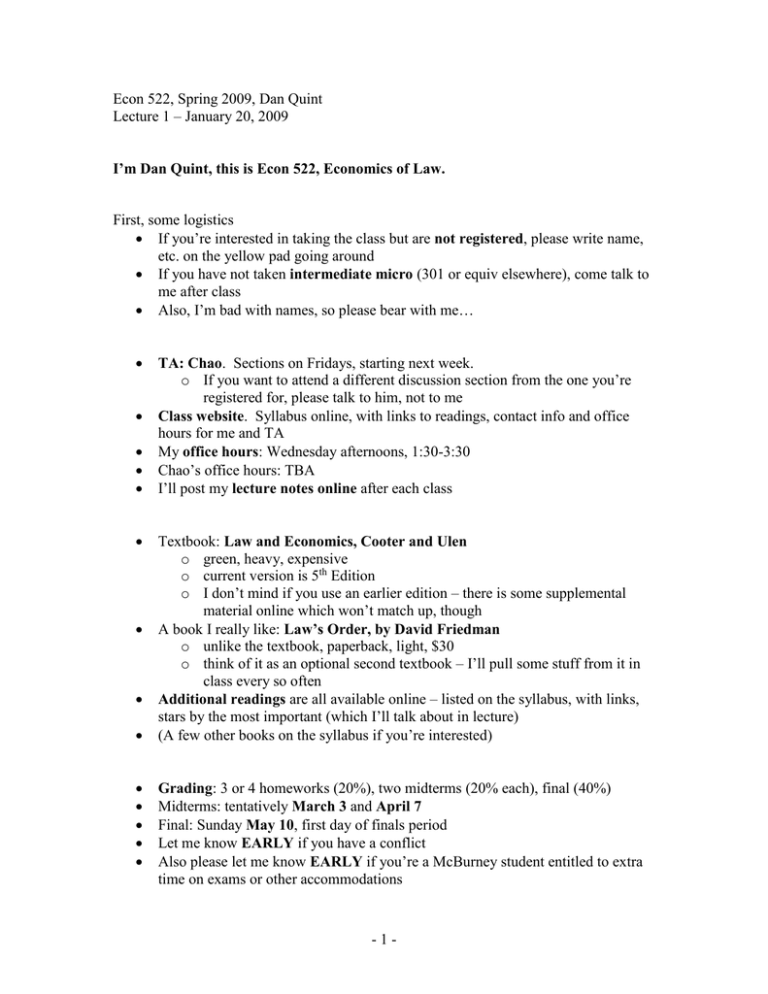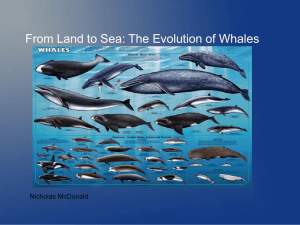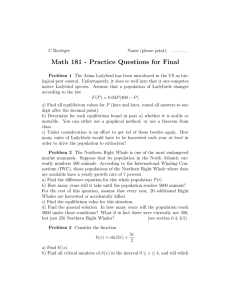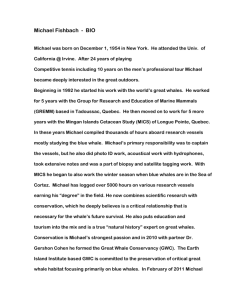Econ 522, Spring 2009, Dan Quint First, some logistics
advertisement

Econ 522, Spring 2009, Dan Quint Lecture 1 – January 20, 2009 I’m Dan Quint, this is Econ 522, Economics of Law. First, some logistics If you’re interested in taking the class but are not registered, please write name, etc. on the yellow pad going around If you have not taken intermediate micro (301 or equiv elsewhere), come talk to me after class Also, I’m bad with names, so please bear with me… TA: Chao. Sections on Fridays, starting next week. o If you want to attend a different discussion section from the one you’re registered for, please talk to him, not to me Class website. Syllabus online, with links to readings, contact info and office hours for me and TA My office hours: Wednesday afternoons, 1:30-3:30 Chao’s office hours: TBA I’ll post my lecture notes online after each class Textbook: Law and Economics, Cooter and Ulen o green, heavy, expensive o current version is 5th Edition o I don’t mind if you use an earlier edition – there is some supplemental material online which won’t match up, though A book I really like: Law’s Order, by David Friedman o unlike the textbook, paperback, light, $30 o think of it as an optional second textbook – I’ll pull some stuff from it in class every so often Additional readings are all available online – listed on the syllabus, with links, stars by the most important (which I’ll talk about in lecture) (A few other books on the syllabus if you’re interested) Grading: 3 or 4 homeworks (20%), two midterms (20% each), final (40%) Midterms: tentatively March 3 and April 7 Final: Sunday May 10, first day of finals period Let me know EARLY if you have a conflict Also please let me know EARLY if you’re a McBurney student entitled to extra time on exams or other accommodations -1- Next, a word of warning: This is a hard class I’m an economist, not a lawyer While the problems we consider are related to law, what I’m really trying to teach here is how to think like a microeconomist o How to use tools from 301, and some new ones I’ll teach, to analyze incentives, behavior, economic outcomes For some people, this way of thinking comes easily For others, it doesn’t But memorizing facts and remembering answers won’t be enough – to do well in this class, you’ll have to understand the logic behind what we’re doing I think of economics not as a set of answers, but a set of tools, a way of analyzing problems – if you can’t learn to think in this way, there’s nothing you can memorize to do well in the class I can basically guarantee there’s someone in here who’s never gotten a C, who will get a C in this class If you had trouble with intermediate micro, or are scared of derivatives, you probably won’t do well in this class (Not trying to scare everyone off, just rather you realize this now rather than right after the first midterm.) -2- So, following that pep-talk, let’s begin with the question: what is Law and Economics? unsatisfying answer: thinking about the law like an economist fundamentally, microeconomics is about how people respond to incentives o a consumer responding to a price o a firm responding to a competitor’s actions o a politician responding to political pressures we’ll be using the tools of microeconomics, including a bit of game theory, to analyze laws and legal systems o the incentives they create o and the actions and outcomes that they lead to an example of how economists look at the law differently than lawyers suppose something has happened o a car ran into a bicyclist o or a shipping company failed to deliver 16 tons of steel girders my construction company ordered o or someone has been murdered. by the time a lawyer sees the case, the “damage” has been done – the incident has already happened what’s left at that point is to assign blame, and perhaps punish someone or have someone pay someone else this is very interesting to the people involved o if you’re the bicyclist, you care very much whether you receive a fat settlement check or not o and it’s interesting to their lawyers but it’s not interesting to economists o because no new value is being created at this stage o all that’s happening is resources being transferred from one person to another -3- so which part of the law is interesting to economists? before the incident happened, lots of decisions were made: o driver decided how fast to drive o bicyclist decided whether to wear a helmet o shipping company decided how far ahead to schedule delivery o my company decided how much to plan around that steel shipment expectations/beliefs about what will happen after the fact influence those decisions o if the driver knows he’ll be punished severely for an accident, he might take a cab home from the bar, or drive slower o if the bicyclist knows he’ll be on his own after an accident, might be more likely to wear a helmet o if my company knows suppliers won’t be punished for failing us, might not be willing to bid on a big construction project these decisions have an impact on outcomes o how many accidents happen o how many construction projects are begun, and completed o and so on and these decisions therefore affect how much value is created (or destroyed) by society – which is very interesting to economists A simple example of how economists think about the law, from the Friedman book (p. 8): You live in a state where the most severe criminal punishment is life imprisonment. Someone proposes that since armed robbery is a very serious crime, armed robbers should get a life sentence. A constitutional lawyer asks whether that is consistent with the prohibition on cruel and unusual punishment. A legal philosopher asks whether it is just. An economist points out that if the punishments for armed robbery and for armed robbery plus murder are the same, the additional punishment for the murder is zero – and asks whether you really want to make it in the interest of robbers to murder their victims. -4- conceptually… 5. laws, legal precedents, legal system 4. expectations about what would happen in a dispute 3. decisions about how to act 1. something happens 2. litigation, punishment/damages what we’re most interested in his how the top one – laws and legal systems – affects the fourth one, what happens of course, there’s also lots of higher-level stuff we won’t be tackling: these laws have to come from somewhere o written by legislators, interpreted by judges o these people also face, and respond to, incentives o legislators had to be elected; judges elected or appointed o all this done within a framework specified in a constitution or something but for this class, we won’t worry that much about where the laws come from, just what their effects will be that is, we’ll mostly be imagining that a law appeared out of nowhere, and analyze the incentives it creates, and the actions and outcomes it will lead to -5- So in a very few words, that’ll be the class. A little more specifically, we’ll be examining three major areas of the law: property law questions like what can be owned, what owners are allowed to do with their private property, etc some questions in property law seem pretty obvious – this is my iPhone, if one of you takes it, I know I have recourse but there are lots of edge cases where things are less clear o do we own our bodies? we can sell our blood, but we can’t sell our kidneys, can’t sell yourself into slavery o do I have a right to be undisturbed on my property, or do you have a right to have people over and make noise? o if you own a house and the government wants to build a school, or a road, or a park, they can force you to sell o if I lose my wallet and you find it, is it yours? contract law what can and can’t we contract on? o can’t contract for sex o if I contract to buy drugs from you, you take my money and give me nothing, I can’t sue you – contracts for illegal purposes aren’t enforceable what constitutes a legal contract? what happens if one of us doesn’t live up to our end of the contract? what “default rules” stand in for terms that we don’t specify? tort law a tort is when someone harms someone else, like in a car accident who’s responsible for accidents? What do they owe? What does this mean for industrial safety regulation? Those three will cover most of the semester – toward the end of the semester, we’ll also look at the legal process itself criminal law and a couple other topics if there’s time. -6- I said just now that we’ll mostly be analyzing laws as if they fell from the sky But obviously they didn’t; and I do want to touch very briefly on a little history Specifically, a little bit about the two great Western legal traditions of the last millennium of so: the common law and civil law traditions The Common Law originated in medieval England still basis for legal systems in many English-speaking countries o U.S. and Canada o Great Britain and Ireland o Australia and New Zealand o parts of Africa and Asia new laws enacted by legislature judges interpret laws, but also rely heavily on precedent – how similar cases were decided in the past one version of the origin of the common law: some English king ordered his courts to go out and examine how people were living, that is, to go “find” the law as it was already being practiced thus, the common law was originally grounded in social norms and practices – how people behaved in the absence of well-defined laws once a court ruled on one case, this established a precedent that other courts would generally follow when ruling on similar cases so the common law is rooted in common practices, except where it’s been replaced by legislation The Civil Law originated with the Napoleonic Code, following the French Revolution persists today in most of Western Europe, Central and South America, and parts of Asia that were not colonized by Britain at the time of the French Revolution, revolutionaries felt the judges, like the king, were corrupt and worthless chose to abandon common law and start fresh Napoleon commissioned a group of legal scholars to draft a new set of laws, the Napoleonic Code These scholars modeled their work on “the Body of the Civil Law”, compiled in sixth century A.D. for Roman emperor Justinian -7- So… the French system which became the Civil Law was based on “ancient sources and pure reason” – a group of scholars starting with a blank slate under Civil Law, arguments appeal directly to the meaning of the law itself, and to commentary on the law which tried to clarify this meaning (in this way, the Civil Law is similar to a legal system based on religion) the English Common Law system, which formed the basis for U.S. law, was based on existing practices of people under Common Law, arguments often focus on legal precedents, and why particulars of past cases make them more or less relevant to the current case a nice example of how the common law responds to existing norms and practices: Robert Ellickson (1989), “A Hypothesis of Wealth-Maximizing Norms: Evidence from the Whaling Industry” The question: who owns a dead whale? In the 1700s and 1800s, whales were hunted for oil, bone, and other valuable products; a captured whale could be worth 3-4 times a typical family’s yearly income Quoting Moby Dick: It frequently happens that when several ships are cruising in company, a whale may be struck by one vessel, then escape, and be finally killed and captured by another vessel…. [Or] after a weary and perilous chase and capture of a whale, the body may get loose from the ship by reason of a violent storm; and drifting far away to leeward, be retaken by a second whaler, who, in a calm, snugly tows it alongside, without risk of life or line. Thus the most vexatious and violent disputes would often arise between the fishermen… Ellickson examines 12 British and American court rulings, mostly from 1800s, where ownership of a dead whale was being contested In each case, the local whaling industry had established norms which were wellsuited to that particular situation And in each case, the court ruled in accordance with the established norm -8- One norm was “fast fish/loose fish” This is the rule mentioned in Moby Dick Established by British whalers in the Greenland fishery o Their prey were right whales – relatively slow and docile o Hunting was done with a harpoon attached to the boat by a rope o While the harpoon was in the whale and attached to the boat, the whale was considered a “fast fish” and belonged to the boat o But if the whale was not yet harpooned, or managed to break free, it was a “loose fish”, and other ships could pursue it and catch it “Fast fish/loose fish” is a very clear, simple rule, so you would expect it to lead to relatively few disputes; and in the case of right whales, it worked well a different norm: “iron holds the whale” “iron holds the whale” was the rule in fisheries where sperm whales were hunted sperm whales swim faster, dive deeper, and fight harder than right whales o hunting them with a harpoon tied to the boat might sink the boat o instead, hunting was done with harpoons connected to “drogues” – objects like wooden barrels that would float behind the whale and tire him out (anyone see Jaws?) o the ship would then follow the whale until it got tired sperm whales also swim in schools o when a ship stumbled into a school of sperm whales, the most important thing was to kill or wound as many as possible quickly, rather than stopping to secure each one so in fisheries where sperm whales predominated, the norm developed that “iron holds the whale” o if you sink a harpoon into a whale, you own it, provided you remain in “fresh pursuit” clear tradeoff between “fast fish/loose fish” and “iron holds the whale” “iron holds the whale” more complicated – what if the whale is found with multiple harpoons? – we’d expect it to lead to more disputes but “fast fish/loose fish” wouldn’t work well with sperm whales -9- a third norm developed in places where finback whales were hunted finbacks are extremely fast swimmers 19th-century whalers hunted them with “bomb lances” dead whales would sink to the bottom immediately, wash up on shore days later needed to be an incentive to hunt them, but also an incentive for someone to harvest the whale when they found it In some places, there was a predefined ratio – a fixed share that the original killer and eventual finder of the whale would each get New England coastal norm was to split the whale roughly according to the effort that each side exerted In Ghen v Rich – a case where a whale hunter sued to recover his share of a whale he had killed – the court’s decision specifically pointed out that if finder were entitled to keep the whole whale, there would be no incentive to hunt whales, and the entire whaling industry would shut down Ellickson emphasizes the observation that in each location, a norm developed which was well-suited to that particular environment o each norm provided sufficient incentives for what was seen as valuable work o (in fact, the incentives may have worked too well – when these norms appeared, whales were plentiful; but in many cases, they were hunted to near extinction) but the point I wanted to make: in each case, the common-law judges deferred to the local custom when making their rulings o local custom was different in different places o in every case Ellickson looked at, court’s ruling matched local custom - 10 - A final point for today, linking whale law to more current-day concerns, and underscoring the way that the common law leans on precedent I stumbled across a brief by a law professor at UC Hastings, Brian Gray, who used the Fast Fish/Loose Fish rule as the basis for arguing the ownership of Barry Bonds’ 73rd home run ball Ownership of the ball was disputed, because one guy initially had it in his glove and then lost it in the scrum, and both he and the guy who ended up with it wanted it. Gray makes the following point, which captures pretty well the essence of the origins of the common law: “Simply put, the Court should adopt a rule of first possession for baseballs that recognizes the longstanding customs and practices of baseball fans who for more than seventy years have competed to catch and gain title to baseballs that leave the field of play.” Although he then goes on to add that existing custom should not be adopted as law when it would lead to particularly bad behavior: “With these principles in mind, the Court should define the law of first possession of baseballs—and decide this case by applying that definition to the evidence—by answering two questions: First, what is the custom, practice, and understanding of baseball fans about first possession and title to baseballs that enter the stands? Second, should the rules as practiced in the stands be modified to minimize the risk of violence, misconduct, and tortious behavior?” (The brief is here: http://web.mac.com/graybe/Site/Writings_files/Hayashi%20Brief.pdf) So that’s a bit of law. Thursday, we’ll talk a bit about economics. Please make sure your name’s on the yellow pad if you’re not registered, and please see me if you haven’t taken Econ 301. See you Thursday. - 11 -

![Blue and fin whale populations [MM 2.4.1] Ecologists use the](http://s3.studylib.net/store/data/008646945_1-b8cb28bdd3491236d14c964cfafa113a-300x300.png)

